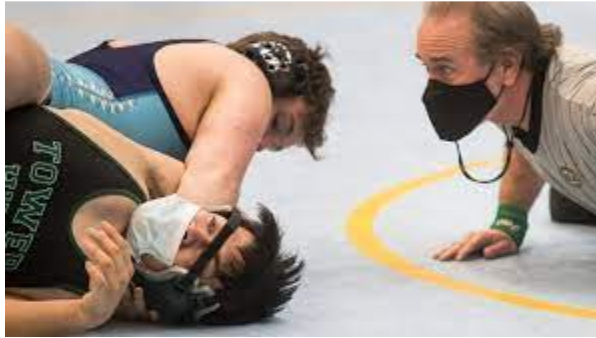How Covid-19 Affected High School Wrestling

(Photo Source: Delaware Online)
May 31, 2023
The Covid-19 pandemic had an overpowering impact on high school wrestling programs across the country. Wrestling, a sport that requires close contact between competitors, has faced numerous challenges, from canceled competitions to the limitations imposed on practices and training. This article will examine the impact of Covid-19 on high school wrestling and explore the ways in which coaches and athletes have adapted to the challenges of the pandemic.
Covid-19’s significant impact on high school wrestling made it difficult to maintain social distancing guidelines, which led to canceling and postponing wrestling matches.
The limitations imposed on wrestling practices made it difficult for wrestlers to train and prepare for competition. There is a saying that goes “You play how you practice,” meaning what you do in practice becomes your habits and you use those when you are wrestling. The uncertainty of the pandemic caused everyone stress and anxiety, especially wrestlers who didn’t know if they would be able to wrestle or not.
Many high school wrestlers were unable to compete in their senior year, which was a heartbreaking experience for them. Preparing for a long time to wrestle at your best, senior year, just for Covid to mess it up would leave any wrestler feeling awful. That’s why the mental health of wrestlers was impacted by the pandemic. Although, some high school wrestling programs were able to adapt and find ways to compete safely.
The pandemic highlighted the importance of mental health support for high school athletes. The impact of Covid on wrestling is still felt to this day.
Again, seniors not wrestling their senior year may have had drawbacks and problems. They could have missed out on opportunities for scholarships or college recruitment letters. Budgeting was also a problem for schools and programs. Some programs may have been forced to cut funding or eliminate the sport entirely.
As well as other things, the pandemic highlighted the need for more flexibility in high school sports programs. Schools need to develop contingency plans for future pandemics or other unexpected events. The importance of mental health support for athletes should also be emphasized.
In return to flexibility, the pandemic also highlighted the need for more support for high school coaches. Coaches have had to adapt to new protocols and find ways to keep athletes motivated during difficult times. Coaches should also be provided resources to help them navigate future challenges.
Despite the challenges, some high school wrestlers were able to find new ways to train and prepare for competition. That shows that if somebody wants something, they just need to put in the effort to get it. Some athletes used the pandemic as an opportunity to focus on strength training or knowledge training. The pandemic also allowed some athletes to explore new training techniques.
Lastly, the pandemic highlighted the importance of communication between athletes, coaches, and parents. Without that communication, tournaments, meets, and various other events would not be able to be coordinated, resulting in frustration and anger from everyone.
In conclusion, the Covid-19 pandemic had a significant impact on high school wrestling programs across the country. The limitations imposed on practices and competitions made it difficult for athletes to train and prepare correctly.
The mental health of athletes slowly depleted because of all the stress that was going on. But, despite the challenges, the resilience and adaptability of coaches and wrestlers allowed programs to continue.
The pandemic highlighted the need for more flexibility, support, and resources for high school sports programs. We hope schools will use the lessons learned from this experience to develop new protocols and contingency plans for future challenges.
